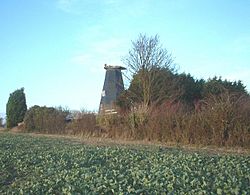New Mill, Northbourne facts for kids
Quick facts for kids New Mill, Northbourne |
|
|---|---|
 |
|
| Origin | |
| Grid reference | TR 331 521 |
| Coordinates | 51°13′11.5″N 1°20′10″E / 51.219861°N 1.33611°E |
| Year built | 1848 |
| Information | |
| Purpose | Corn mill |
| Type | Smock mill |
| Storeys | Four-storey smock |
| Base storeys | Single-storey base |
| Smock sides | Eight-sided |
| No. of sails | Four |
| Type of sails | Double Patent sails |
| Windshaft | Cast iron |
| Winding | Fantail |
| Fantail blades | Six blades |
| Auxiliary power | Steam engine 1886 - 1947 Electric motor 1951 - 1957 |
| No. of pairs of millstones | Three pairs |
New Mill is a special old windmill located in Northbourne, Kent, England. It was built in 1848 and is now a Grade II listed building. This means it's an important historical place that needs to be protected. Today, the mill has been changed into a home.
Contents
The Mill's Story
Building the Mill
New Mill was built in 1848 by two skilled builders named J J and T R Holman. They were millwrights from Canterbury, which means they specialized in building and repairing mills. The mill cost about £600 to build back then.
When it was first made, the mill had two pairs of millstones. These large, heavy stones were used to grind grain into flour. Some of the parts used in the mill were actually second-hand, meaning they had been used before.
Adding Power and Repairs
Over the years, the mill got some upgrades. In 1886, a powerful 7 horsepower steam engine was added. This engine helped the mill work even when there wasn't enough wind. It cost £210. A few years later, in 1892, a third pair of millstones was installed, allowing the mill to grind even more grain.
In 1910, the Holman millwrights came back to fix up the mill. They replaced two corner posts and added a new sail.
Facing Challenges
Windmills rely on their sails, and sometimes strong winds can cause damage. In July 1915, a big storm blew off two of the mill's sails and its fantail. The fantail is a small windmill at the back that helps turn the main cap to face the wind.
The mill was repaired in 1916, but after that, it only ran with two sails instead of four.
Changes in Power
The steam engine that was added in 1886 was removed in 1947. However, the mill continued to grind grain using wind power until 1949. After that, it stopped working for a short time.
From 1951 to 1957, an electric motor was used to power the mill. This shows how technology changed over time, moving from wind to steam and then to electricity.
Becoming a Home
In 1976, New Mill was no longer used for grinding grain. Instead, it was converted into a house, giving this historic building a new purpose. The old shed where the steam engine used to be was even used as a bed and breakfast for visitors until around 2013.
As of 2020, New Mill is purely a residential home and has new owners.
How the Mill Works
New Mill is a special type of windmill called a smock mill. It has four main levels, or storeys, built on top of a single-storey brick base. Imagine a tall, eight-sided tower that looks a bit like a farmer's smock (a loose outer garment).
There was a platform, called a stage, at the first-floor level. This stage allowed millers to reach the sails and other parts of the mill.
The mill had four double Patent sails. These sails were attached to a strong cast-iron windshaft, which is the main axle that turns when the wind blows the sails. A fantail at the back of the mill automatically turned the cap (the top part of the mill) so the sails always faced the wind.
Inside, the mill had three pairs of millstones to grind grain. Even though it's a house now, some of the original machinery is still there! You can still see the windshaft, one pair of millstones, and parts of the engine driveshafts and gears that connected to the millstones. There's also the governor and its tentering gear, which helped control how fast the millstones turned. The frame of the cap, the curb (a circular track), and the rollers that helped the cap turn are also still present.
Millers Who Worked Here
These are some of the people who operated New Mill over the years:
- Richard Fuller 1848 - 1881
- Thomas M Fuller 1881 - 1902
- Ernest M Fuller 1902 - 1957
- Richard J Fuller 1930 - 1957
 | Sharif Bey |
 | Hale Woodruff |
 | Richmond Barthé |
 | Purvis Young |

